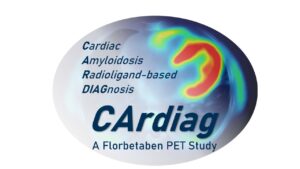 BERLIN, Germany, February 7, 2023 – Life Molecular Imaging (LMI) announces today that the first patient has been imaged with [18F]florbetaben in the CArdiag Phase 3 clinical study. This is an open-label, multi-center, non-randomized pivotal Phase 3 study to evaluate the diagnostic efficacy of [18F]florbetaben Positron Emission Tomography (PET) imaging to diagnose cardiac AL amyloidosis in patients with suspected cardiac amyloidosis.
BERLIN, Germany, February 7, 2023 – Life Molecular Imaging (LMI) announces today that the first patient has been imaged with [18F]florbetaben in the CArdiag Phase 3 clinical study. This is an open-label, multi-center, non-randomized pivotal Phase 3 study to evaluate the diagnostic efficacy of [18F]florbetaben Positron Emission Tomography (PET) imaging to diagnose cardiac AL amyloidosis in patients with suspected cardiac amyloidosis.
The CArdiag Phase 3 clinical program will be performed in Germany, Spain, UK and US – and will enroll approximately 200 patients globally. The primary objective is to determine the sensitivity and specificity of the visual assessment of [18F]florbetaben PET images for the diagnosis of cardiac AL amyloidosis compared to standard of care clinical diagnosis.
[18F]florbetaben PET is validated and approved to detect neuritic beta amyloid plaques in the brain and available via a global supply network marketed as Neuraceq®. Initial clinical data showed that amyloid deposits of other origin in the heart, such as AL amyloid and transthyretin (TTR) amyloid, can also be detected. Based on these data, the European Commission and the U.S. Food and Drug Administration granted orphan drug designation to [18F]florbetaben in 2020 as a diagnostic tool for AL amyloidosis. The detection of amyloid deposits in the heart will be further investigated and validated in the current Phase 3 trial. Exploratory analyses will evaluate the possibility for a differential diagnosis between the two main types (AL and ATTR) of cardiac amyloidosis by [18F]florbetaben PET.
“Expanding the indication for our amyloid PET tracer from detecting ß-amyloid deposits in the brain to detecting amyloid deposits in the heart in patients with cardiac amyloidosis will allow us to support an earlier diagnosis of this rare and life-threatening disease”, said Dr. Ludger Dinkelborg, CEO of Life Molecular Imaging. “We are proud to announce the start of this Phase 3 study, which marks another milestone on our vision to reduce the burden of disease by improving early diagnosis and characterization of chronic and life-threatening diseases.”
“Cardiac AL amyloidosis is a progressive and life-threatening disease, and its diagnosis and treatment are challenging”, said Dr. Andrew Stephens, MD, PhD, CMO of Life Molecular Imaging. “[18F]florbetaben PET imaging of patients with suspected cardiac amyloidosis has the potential to become an important tool to simplify and shorten the time to diagnosis, providing earlier and appropriate access to therapy and improved monitoring of such interventions.”
Further details of the CArdiag Phase 3 study design are available on clinicaltrials.gov (NCT05184088).
About [18F]florbetaben
[18F]florbetaben is a radioactive diagnostic agent indicated for Positron Emission Tomography (PET) imaging of the brain. [18F]florbetaben has been approved by the FDA and EMA for routine clinical use, and has local regulatory approval in other countries such as Japan and Korea. It binds to beta sheet structure of amyloid proteins. [18F]florbetaben is marketed as Neuraceq® to estimate the neuritic beta amyloid plaque density in adult patients with cognitive impairment who are being evaluated for Alzheimer’s disease (AD) and other causes of cognitive decline. [18F]florbetaben is currently under investigation as a targeted radiopharmaceutical for the detection of amyloid deposits in the heart and other organs of patients with cardiac and systemic amyloidosis of AL and ATTR type.
Most Common Adverse Reactions
In clinical trials including demented and non-demented subjects, the most frequently observed adverse drug reactions in 872 subjects with 1090 Florbetaben (18F) administrations were injection/application site erythema (1.7%), injection site irritation (1.1%), and injection site pain (3.4%).
About Life Molecular Imaging (LMI)
Life Molecular Imaging (LMI, formerly Piramal Imaging) was formed in 2012 with the acquisition of the molecular imaging research and development portfolio of Bayer Pharma AG. It is now part of the Alliance Medical Group (a member of the Life Healthcare Group) offering an integrated business including research and development laboratories, a network of cyclotrons, radiopharmacies and imaging facilities. By developing novel PET tracers for molecular imaging, LMI is focusing on a key field of modern medicine. The organization strives to be a leader in the Molecular Imaging field by developing innovative products that improve early detection and characterization of chronic and life-threatening diseases, leading to better therapeutic outcomes and improved quality of life. Please visit https://life-mi.com.
About Life Healthcare Group
Life Healthcare is a global people-centered, diversified healthcare organization listed on the Johannesburg Stock Exchange. Life Healthcare has over 38 years’ experience in the South African private healthcare sector, and currently operates 66 healthcare facilities in southern Africa. Services include acute hospital care, acute physical rehabilitation, acute mental healthcare, renal dialysis, and wellness, occupational health, primary health and emergency medical services. The Group owns Alliance Medical Group, the leading independent provider of medical imaging services (MRI, CT and PET scans) within Europe, operating internationally across 10 countries. Life Molecular Imaging, a division of Alliance is an integrated pharmaceutical business that includes research and development laboratories, access to a network of cyclotrons and radio-pharmacies and imaging facilities, with Life Radiopharma being Alliance’s distributor of radiopharmaceuticals to diagnose many types of diseases. Visit https://www.lifehealthcare.co.za/
For media queries contact:
Dr Iris Hardewig
i.hardewig[at]life-mi.com

